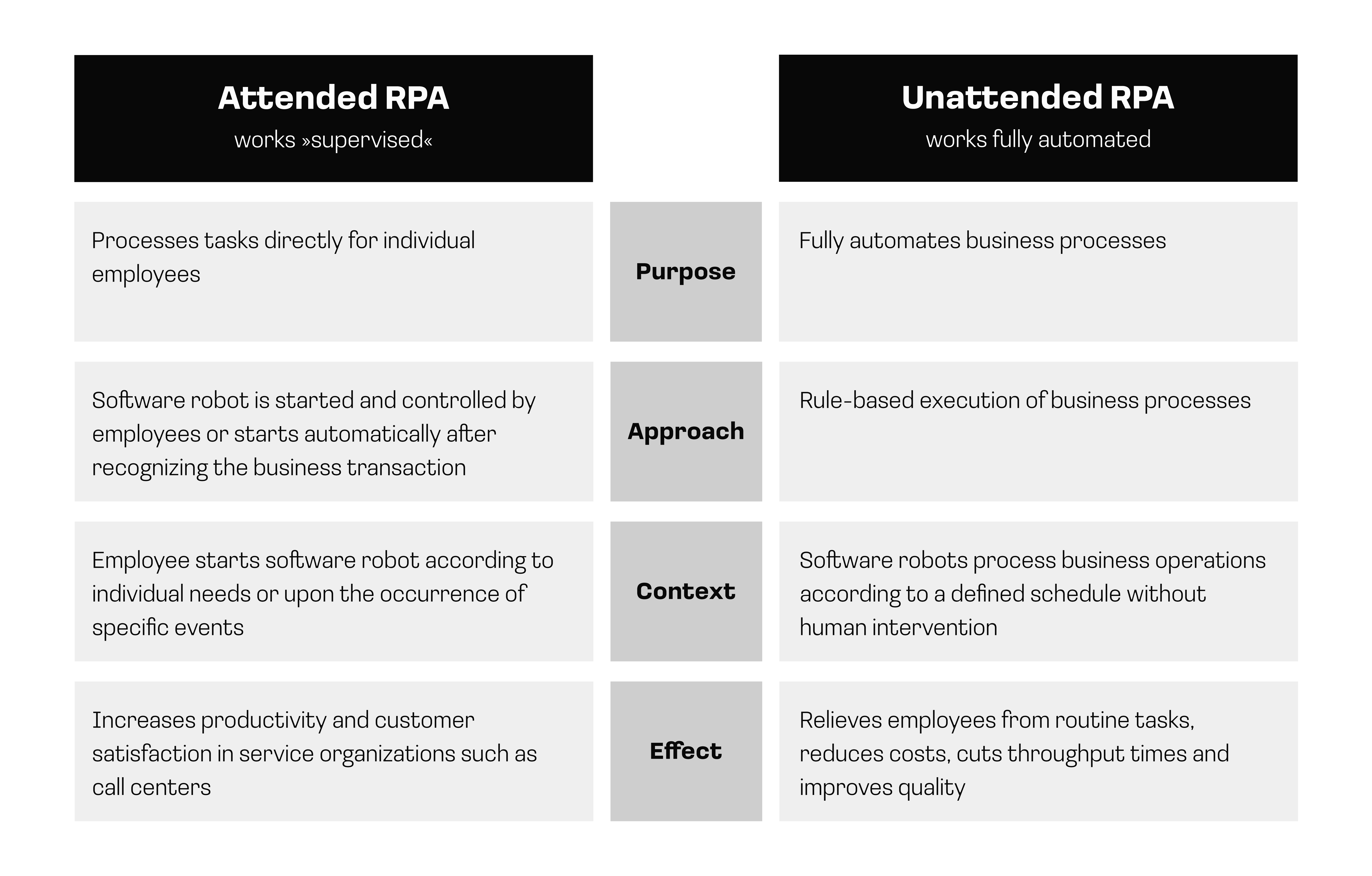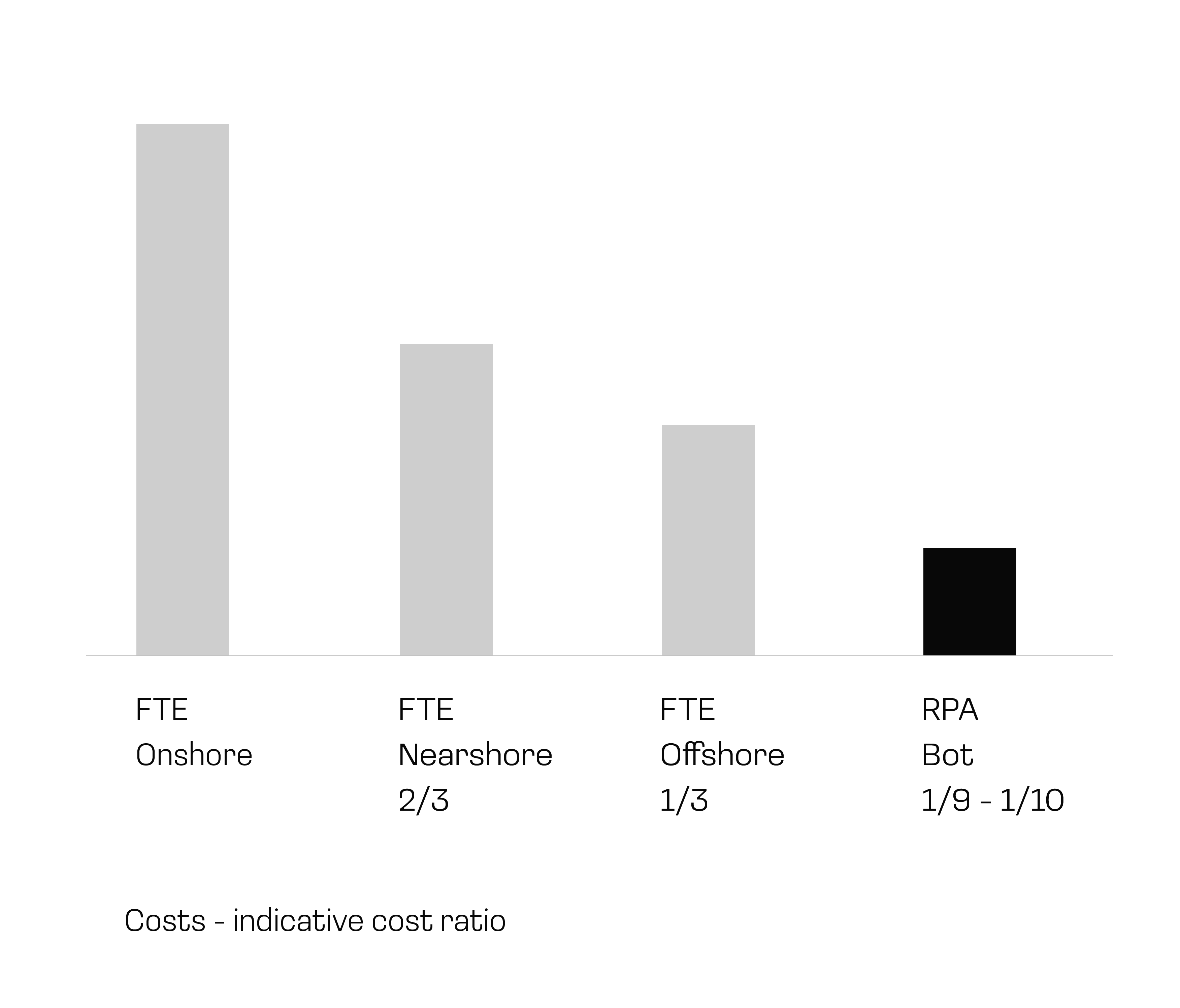Automation of Standard Processes: All advantages of RPA at a Glance

Michael Arns
Robotic process automation (RPA) helps companies to increase the efficiency and agility of their processes. Especially those that are less complex, repeated frequently and rule-based.
RPA is particularly suitable for structured processes and routine tasks and enables the automation of the interface between man and machine. Those processes account for almost half of all company workflows and could be effectively automated with RPA. Thus, RPA represents an important step towards digitalization.
Attended RPA and Unattended RPA
Robotic Process Automation is a technology that enables software robots to imitate human interactions with digital systems in order to perform repetitive, rule-based tasks. Essentially, RPA works on the basis of algorithms and rules defined by developers to automate specific tasks.
There are two variants of RPA: attended and unattended.
Attended RPA is monitored by employees and is suitable for situations where direct interaction with the user is required, such as in the service desk. Unattended RPA, on the other hand, works fully automatically and is configured for rule-based processing of business processes.

12 Benefits of RPA
- 24/7
- Quality and compliance
- Scalability and time to market
- Increase in turnover
- Productivity
- Employee and customer satisfaction
- Employee orientation
- Cost reduction
- Integration of existing systems
- Process optimization
- Digitalization and digital workforce
- Sustainability
In the following we will take a closer look at the benefits of RPA and its impact on various aspects of business.
1. 24/7
Software robots are not subject to working time restrictions, do not require breaks and do not tire. The ability to use them 24/7 gives companies the flexibility to run processes continuously and without interruption. This is particularly beneficial for organizations with global business operations or those that rely on continuous process execution to gain competitive advantage. The use of Unattended RPA enables companies to ensure consistent performance without human intervention. This increases efficiency and reduces costs.
2. Quality and compliance
By automating rule-based processes, RPA minimizes the risk of human error and increases adherence to regulations and compliance standards. This is because every process runs in exactly the same way - according to the previously defined process rules. Rule-based processes with high human error rates are therefore very well suited to automation with RPA. RPA can also provide useful support when it comes to compliance. The solutions adhere to defined rules and guidelines with great accuracy and consistency. With the right configuration, they also document every work step to any desired level of detail - and do so fully automatically. The company always retains an overview, can make decisions based on reliable data and increase the quality of reporting. Adherence to compliance regulations is therefore easier to prove and verify.
3. Scalability and time to market
RPA offers companies the ability to quickly and easily add additional capacity to respond to changing business needs or seasonal peaks. Unlike manual processes, where scaling is limited by the availability and training time of new employees, software robots can be put into operation seamlessly and immediately. This enables companies to shorten their time-to-market and respond quickly to new opportunities or challenges.
4. Increase in turnover
By automating routine activities, employees have more time for value-adding tasks, such as processing customer inquiries. This can lead to significantly higher customer satisfaction and consequently to more sales. This area of benefit can also be addressed in the Attended RPA variant in particular. With Attended RPA, software robots support employees in real time by taking over process steps such as the automatic calculation of tariffs. The primary aim is to relieve employees and increase their working speed. This creates more time for individual consultations with customers, for example.
5. Productivity
By relieving employees of repetitive, time-consuming tasks, RPA enables a significant increase in the productivity of individuals and teams. Software robots can perform tasks with a speed and accuracy that is unattainable for human workers. This leads to shorter turnaround times, more efficient use of resources and an overall increase in work performance. However, the response times of the applications used by a bot are a limitation.
The high expectations of companies regarding improved productivity through RPA are being met. This is also confirmed by a study conducted by management consultants Deloitte in 2018: over 90% of the companies surveyed believe their expectations have been met or exceeded.
6. Employee and customer satisfaction
»Goodbye manual tasks, hello value work.« By automating monotonous and repetitive tasks, employees can spend more time on more challenging tasks, which increases their job satisfaction and motivation. Customers also benefit from faster and more precise processing of inquiries or orders, which leads to greater satisfaction and loyalty.
7. Employee orientation
The introduction of RPA can be used as an opportunity to improve the working environment for employees and support them in developing new skills and competencies. As RPA automates monotonous work processes, time is available for new, more challenging tasks. Challenging tasks correlate with increased job satisfaction. This effect is amplified by creating working conditions where more time and opportunities for human interaction are available. All of this can have a positive impact on the well-being of the workforce and their commitment to the company.
8. Cost reduction
One of the most obvious benefits of RPA is the potential cost savings for companies. By automating repetitive and time-consuming tasks, companies can reduce labor costs, minimize human error and increase efficiency. It also frees up employees to focus on more productive and value-adding tasks, which can have a positive impact on the company's turnover. The possibility of 24/7 operation also ensures improved capacity utilization and an overall lower cost structure.

9. Integration of existing systems
RPA offers companies the opportunity to seamlessly integrate their existing legacy systems into new digital processes. This can create completely new options for digitalization. As a rule, new interfaces to grown legacy systems are difficult to implement, risky or expensive. This contrasts with the RPA approach, which continues to use the existing front end of the applications. In this sense, it can also be a cost-effective tool for system integration.
10. Process optimization
Entry into the world of automation with RPA regularly involves the selection of suitable processes. It is not uncommon for it to become clear during the corresponding analysis that the existing processes are not optimal. This can be a good reason to first scrutinize the processes and redesign them if necessary. The efficiency of RPA can be further increased by automating optimized processes. In addition, RPA offers the opportunity to continuously monitor and adapt business processes in order to meet changing requirements and market conditions.
11. Digitalization and the digital workforce
The fundamental understanding of the concept of a digital workforce associated with RPA is also interesting. This digital workforce extends the human workforce and reliably relieves them of monotonous and repetitive tasks. The result is a productive overall system that is supported by satisfied people. For this to succeed, a powerful RPA platform is required, such as CORBOX Robots-as-a-Service.
12. Sustainability
RPA enables many business processes to be handled in a much more resource-efficient manner. Automation with the help of software robots reduces physical resource consumption. Although energy is required to operate an RPA infrastructure, a digital workforce eliminates the consumption of resources through transportation, buildings and individual traffic. In addition, software robots can help reduce paper consumption by replacing paper-based processes with digital alternatives.
Conclusion
Robotic process automation (RPA) offers companies many advantages. From increasing efficiency and productivity to improving compliance and customer loyalty, RPA offers numerous opportunities to optimize business processes and gain a competitive advantage. Despite this potential, it is important to note that RPA is a complex technology that requires thorough planning, implementation and maintenance. Without the appropriate expertise and experience, it can be difficult to effectively design and implement RPA solutions. The more complex the process to be automated, the more sophisticated the underlying logic needs to be. Often, such automation involves multiple steps that need to be seamlessly integrated with each other. Otherwise, there is a risk of tasks being performed incompletely, data being processed incorrectly, manipulated or even systems being blocked. As RPA robots work with sensitive data and systems, it is important to take appropriate security measures and rules into account beforehand to prevent data leaks.
Professional partners with extensive knowledge of process automation, IT infrastructure and compliance can help companies successfully implement and operate RPA. They can help select suitable processes for automation, design and customize RPA solutions, and provide training for employees. They can also support the integration of RPA into existing systems and workflows and ensure that the implementation complies with applicable regulations and best practices. With more than 25 years of experience, we are specialists in the field of Automation and have already implemented numerous successful RPA projects in mission-critical business areas. As a long-standing partner of the leading RPA providers, we find the best solution for every customer requirement.
